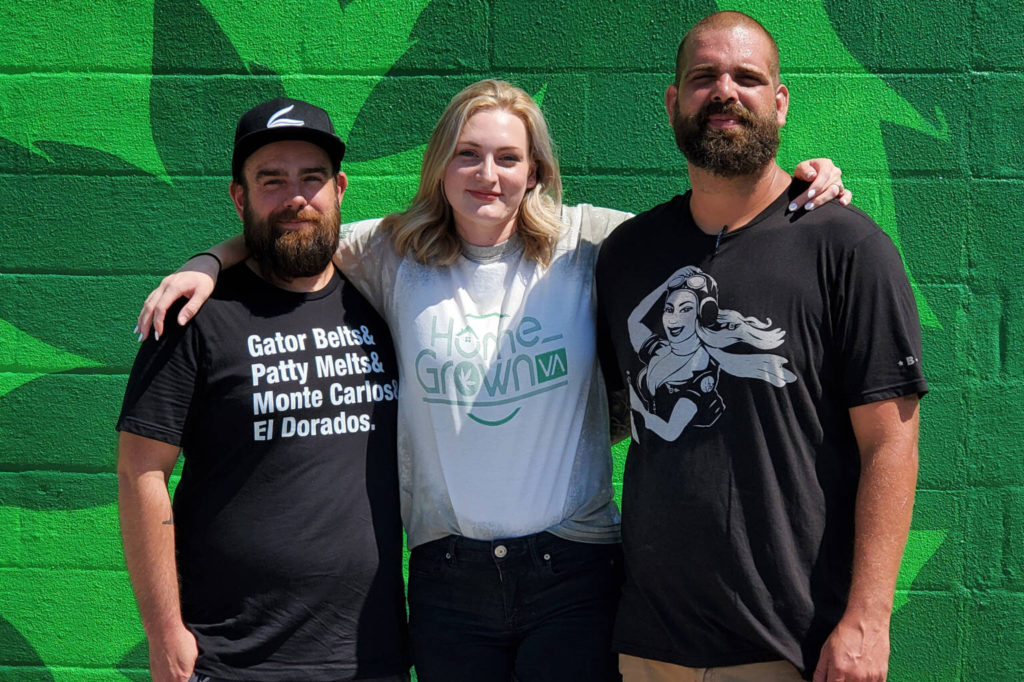Note: This story was first published by District Fray Magazine as part of a collaboration with The Outlaw Report on Take Me Down to Cannabis City, an insider’s guide to the legalization of cannabis in Virginia.
About 20 years ago in Temecula, California, Joe Vega stepped out into his parent’s backyard to plant his first cannabis seed. It was the early aughts, and Vega was still in high school. The fear of pot loomed large and growing the plant was illegal in every U.S. state. But Vega’s parents were out of town that day, and his grandma was the only adult in charge.
“Nobody ever noticed,” he says.
Vega kept casually growing pot as an adult, picking up new techniques from fellow cultivators as he moved from one city to the next, eventually settling down in Richmond, Virginia. He never really considered growing weed could be more than just a backyard hobby until two years ago, after attending a cannabis trade show in Michigan.
“We should do this,” he remembers thinking.
Then, Virginia passed sweeping new cannabis legislation that, along with legalizing possession and recreational sales, authorized adults to grow up to four plants per household. So on July 1 — the day the new laws went into effect — Vega and his business partner, Patrick Hilleary, opened up HomeGrown VA, a new gardening center in Richmond that specializes in cannabis cultivation.
“We realized with legalization — especially with Covid-19 — a lot of people became interested in growing their own medicine,” he says. “We wanted to help facilitate that.”
Located just outside Richmond’s trendy Scott’s Addition neighborhood, the store boasts more than 2,000 square feet of retail space where pot enthusiasts can find all the tools and supplies needed to start growing at home. This includes soil, fertilizer, nutrients, harvesting tools and high-powered lights for indoor cultivation, among other items.
Hilleary says growing pot isn’t necessarily complicated — it’s called weed for a reason. For growers who want to get technical, though, the sky’s the limit.
“I would say it’s as easy or as hard as you want to make it.” he says.
According to Vega, growing outside usually means less maintenance.
“Outdoors you’ll get a lot of hardier plants, just because the sun and the wind can’t be replicated,” Vega says.
Growing in an indoor environment, however, tends to require more equipment and a higher level of precision, requiring controlled temperature, humidity and vapor pressure. And while most soils will work, it’s always best to use something rich in organic matter.
HomeGrown VA sells products like Sloppy Bunz, a top soil made from rabbit droppings, worm excrement, fermented alfalfa leaves, bacteria and coconut fiber. To the average gardener, that mix might not sound very appealing. Vega, on the other hand, gets a real kick out of the ingredients.
“Basically, it’s a bunch of fungus and bacteria and we got ourselves a party,” he says.
HomeGrown VA isn’t Virginia’s only grow shop, though it’s among the first to openly market itself as a cannabis business. Before legalization, strict cannabis laws forced weed nurseries to hide behind names like “hydroponic shop” to avoid legal woes.
Hilleary says it’s time for the era of taboos to end, which is why he and Vega picked a logo for HomeGrown that prominently features a cannabis leaf.
“It’s completely legal and we’re not going to hide behind it,” he says. “If we’re going to do this, let’s be open about what we’re doing.”
But being forthcoming hasn’t been without consequences. Despite legalization, Vega and Hilleary have repeatedly run into issues with companies who refuse to work with cannabis businesses. They’ve been declined services by credit card companies, online marketplaces and even social media platforms like Facebook, which blocked HomeGrown from creating a business profile.
“We can’t run any kind of ads or promotion, we can’t promote anything that we do,” Vega says.
Then there’s the issue of seeds.
Under Virginia’s new laws, recreational cannabis sale — which includes seeds and clones — won’t be authorized until 2024. For a cannabis nursery, it’s an elephant in the room: How can customers grow pot if they can’t buy seeds or seedlings?
Vega says she doesn’t plan on selling seeds until it’s 100% legal. In the meantime, HomeGrown regularly hosts seed giveaways and swaps where experienced cultivators trade goods. Even gifting seeds can get dicey, though.
Sharing and gifting cannabis became legal on July 1, but the new laws stipulate no gift can be tied to a separate transaction or advertised parallel with another sale. The provisions are meant to prevent loopholes that could lead to a gifting economy, like in D.C. For Vega, the restrictions on seeds are frustrating and unwarranted. As far as he’s concerned, the restrictions only perpetuate the stigma against cannabis businesses.
“It’s the idea that [cannabis is] something different — but it’s just a plant,” he says. “It’s a tomato, it’s a pumpkin, it’s a cucumber, it’s a sunflower. There’s no difference between us and the garden center at Lowe’s.”
(Photo: Peter Hilleary, Natalie McFarland and Joe Vega pose outside HomeGrown for the cannabis nursery’s grand opening on July 1, 2021 in Richmond, Va.)

